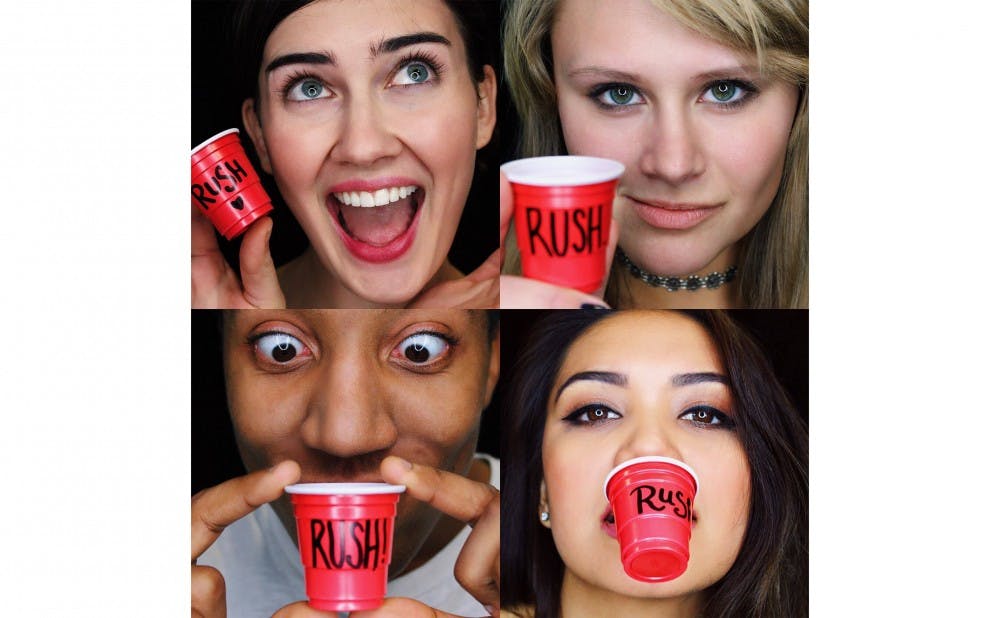Spring semester’s presence has been looming closer, surveying the student body on its silent haunches, waiting for the perfect moment to unload its burdens as winter break draws to a close. Perhaps it was a professor’s email, dispatching required textbooks and banal syllabi, or the multiple Duke Alerts about the debilitating inch of snow received by the Triangle Area that forewarned the new semester’s commencement. But for most, there has been one telltale, inescapable indicator—Greek and SLG rush.
A formidable source of both apprehension and excitement for a myriad of students, the rushing process starts as soon as classes do. Thankfully, there’s a way to soothe any biding trepidation about the process to come: Duke Student Broadcasting’s new mini-series “RUSH!” premieres Jan. 12 on DSB’s YouTube channel. The six-episode mockumentary follows three freshmen going through Greek rush. Even the stylization of “RUSH!” begs a second look—the sardonic exclamation point and in-your-face capitalization hint at the jokes to come.
The show’s nucleus is junior Cara O’Malley, who is the entertainment director for DSB and created, wrote, produced and edited “RUSH!” After noticing a lack of scripted series within DSB, she pitched the show to the incoming director and received the green light for the project. Placed in a purposefully vague university setting, “RUSH!” chronicles the recruitment experience of Kate (played by junior Peyton Dilweg), who ropes her friends Jocelyn and Caleb into rushing with her (played by junior Melissa Carrico and senior Chaz Hawkins, respectively). While “RUSH!” portrays Greek recruitment and its innumerable ups and downs, the show is not merely a documentation of the rushing process.
“It has Greek life and rush more as the backdrop, and they kind of create the goal for the characters,” O’Malley explained. “But what [the show is] really focusing on is these main characters and how they’re slowly becoming friends and their relationships and dealing with college.”
While not affiliated with a sorority but rather the SLG Arts Theme House, O’Malley drew most of her inspiration for the show from online forums where people wrote about the absurd things that happened to them when they were rushing. But, as evidenced by many of the portrayals of Greek life in television and movies (see: “Greek,” “Sydney White” and “The House Bunny”), it’s easy to hyperbolize sororities, fraternities and their members: something that O’Malley was conscious of when writing the series.
“I really tried to make it where we had a balance of making [the show] into this trope and what you think sororities and fraternities are and then humanizing [the characters] and realizing that they’re not just these two-dimensional people,” O’Malley said.
Likewise, since “RUSH!” mainly revolves around two women rushing sororities, O’Malley found it essential to depict women as more than catty, judgmental and cutthroat.
“I wanted very much to portray this in a more human way and especially with women, I think often times with women in these shows…they’re written by men, and they’re very two-dimensional,” O’Malley said. “I wanted to focus on the female friendships that can evolve whether it’s in Greek life or not and really show these people as multifaceted women.”
Another stereotype that O’Malley explored in the show is rushing fraternities as the “token black guy,” a tactic of the character of Caleb, which can particularly pervade Greek organizations at racially and culturally homogenous universities. Chaz Hawkins, who plays Caleb and is a member of Wayne Manor, spoke on his character’s importance in demonstrating the need for representation in such settings.
“The point of the character is like, yes, I am a black guy playing a token black guy, but it’s for the purpose of getting the audience to understand that this is the reality that some people do face, that some people do look at as a means of getting into Greek life,” Hawkins said. “Greek life can be very white-washed.”
Sophomore Will Francis, who co-wrote and directed the series and is also a member of Wayne Manor, stressed that “RUSH!” wouldn’t be appealing if its main focus was on criticizing Greek organizations and their practices. While it poked fun at the tumult and absurdities that can often times accompany the rushing process, the show’s footholds are in the self-actualizations and growth of its main characters.
“I think the bottom line ended up being that things are going to work out. A lot of freshmen are so worried about where they’re gonna end up, if they’re gonna get into where they want and if they don’t get in, are they just going to have a terrible experience at Duke?” Francis said. “What we tried to say is that you’re gonna be fine, things are going to work out, you’ve already met people that you want to keep spending time with because your social life isn’t dependent on what group you join the second semester of your freshman year.”
These sentiments were mirrored by junior Peyton Dilweg, who plays Kate in the series.
“Even if you don’t get into the sorority of your choice or any sorority at all–it sounds cliché–but it really doesn’t define you as a person or your worth,” Dilweg said. “It can be enjoyable and a terrific way to bond with people but it’s not a necessary element of your college experience if you realize that it doesn’t define you.”
It is a forceful message that is of special value as rush begins and freshmen are confronted with the allure of conformity and ease of putting on facades in order to be accepted by Greek organizations and SLGs. “RUSH!” provides the much-needed reminder that the coolest thing you can be is yourself–regardless of what the movies may lead you to believe.
As Francis puts it, “Don’t worry–everything’s gonna be alright.”
A previous version of this article stated that "RUSH!" premiered Jan. 8. The series premieres Jan. 12. The Chronicle regrets the error.
Get The Chronicle straight to your inbox
Signup for our weekly newsletter. Cancel at any time.

